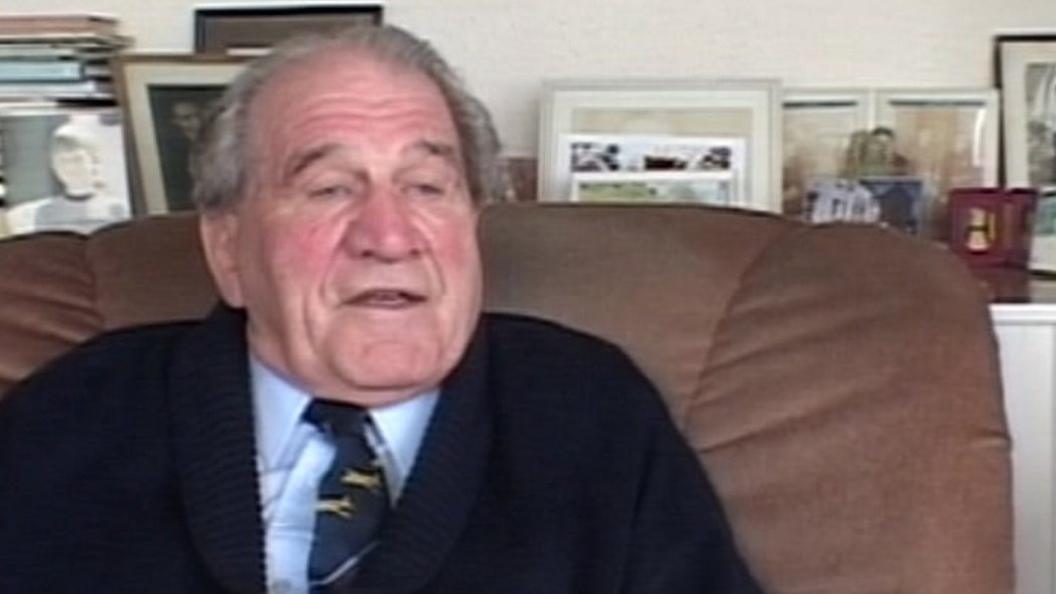VE Day: 'I drove general to WW2 unconditional surrender'
- Published
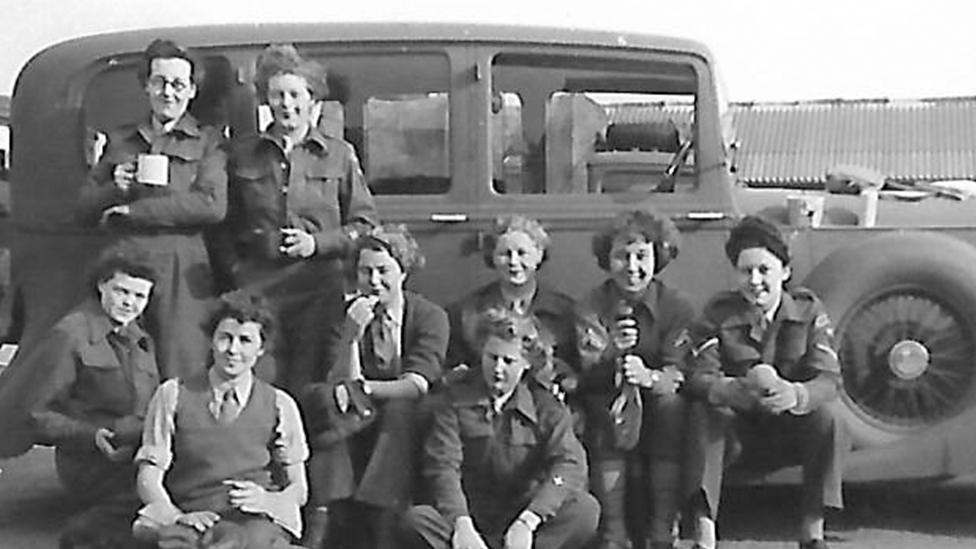
A member of the Auxiliary Territorial Service (ATS) Marjorie drove a general to the signing of the treaty in Reims
"There was singing and great great joy, there was no question it was all over."
Standing in the packed streets of Versailles, France, 75 years ago, Marjorie Morgan celebrated VE Day.
Just hours before, she had driven an Allied general to Reims, and stood outside as a German general signed the unconditional surrender to end World War Two in Europe.
"To me it was just a job, it was something you think about afterwards", she said.
While the 98-year-old believes there was nothing remarkable about her role during the war, hers is one of the many incredible stories of sacrifice made by people from communities across Wales all those years ago.
Today, like others who remember that time, Marjorie will celebrate the anniversary of VE Day on a much smaller scale, unable to see her family in person due to the coronavirus restrictions.
Eva May Cotter, who turns 100 on Monday, recalls the "whirlwind" of VE Day
"I've got to be honest, I think this thing we're going through now is worse than the war," she said. "At least we knew who our enemy was."
The great-grandmother of 14 will be joining in the celebrations going on across Wales, including a sing-along, raising a toast and enjoying scones in a socially-distanced party with her neighbours on her street in Barry in south Wales.
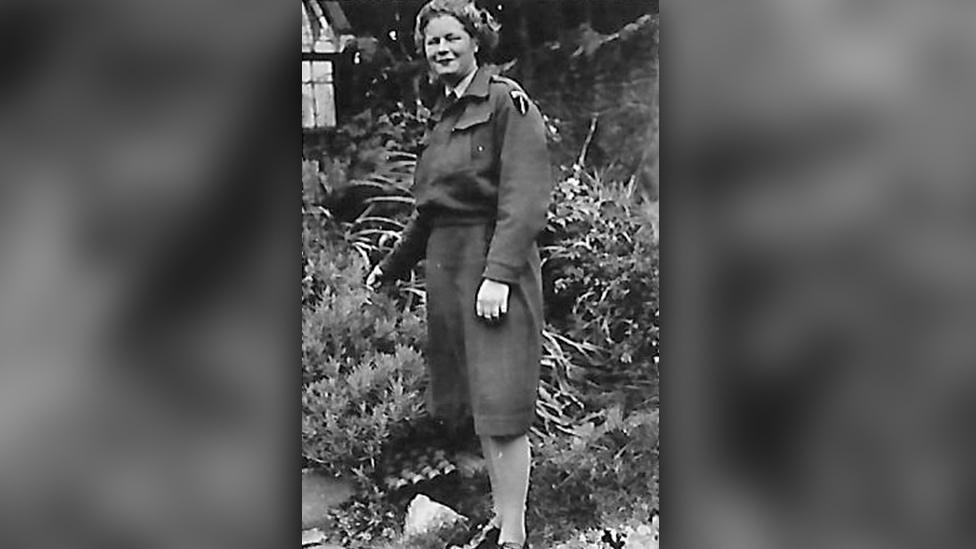
After VE Day Marjorie went on to Frankfurt and to the British Army headquarters in Berlin
Marjorie, like thousands of women, joined the Auxiliary Territorial Service (ATS), the women's branch of the British Army during the war effort.
After spending years as an army driving instructor, by 1945 she was driving generals, and ended up driving to the Supreme Headquarters Allied Expeditionary Force (SHAEF) in Reims, where General Alfred Jodl, German Chief of Operations, signed the unconditional surrender.
But when her car was requisitioned by another general of a higher rank, Marjorie described how the general "stole" a jeep to get there instead, but the gearstick was stuck, and she had to drive all the way there in first gear.
The surrender in Reims was signed in the early hours of 7 May. There was supposed to be a 36 hour embargo so generals could inform their troops, but it was leaked by the press a day early - so VE Day fell on 8 May.
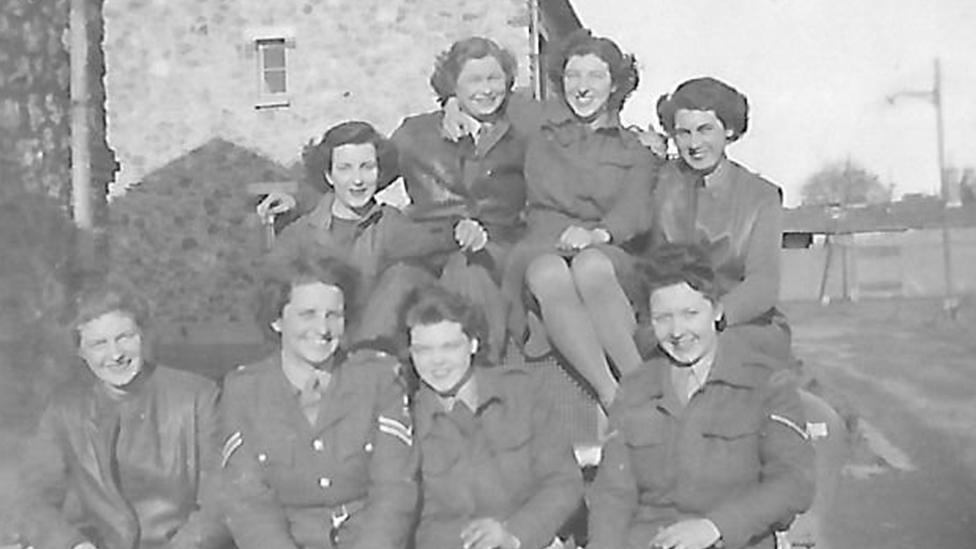
Marjorie said for her that VE Day "was a day of fun" and "then it was back to work again"
Afterwards, she was invited by the general to go on a tour of a Champagne cave, before heading back to Versailles, where the streets were "packed".
"It was tremendous as you can imagine," she said.
She said the war was "very grim", and she remembers the bombs falling in London, when she worked at the War Office, but she felt "very detached from it".
"The bombs had a very specific droning noise, when the engine cut out, and it cut out dead, you knew it was coming down, and you'd hear a thud where it landed," she recalled.
"You don't get scared for long ever, about a quarter of an hour. In the end, you felt almost blase about it, you don't stay terrified, it's hard to believe but it's a fact."

The D-Day veteran
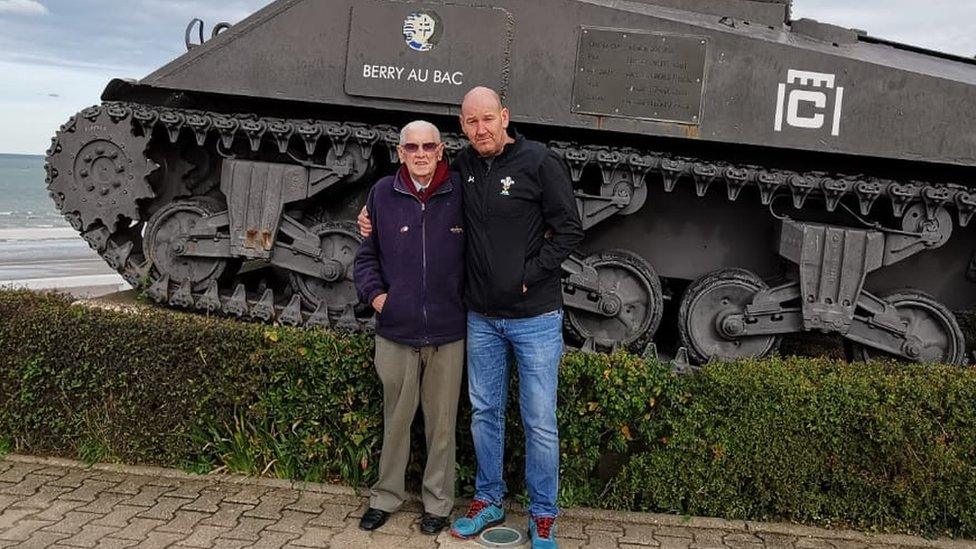
D-Day veteran William Davies revisited Normandy last November
"A lot of my men of my age were shot, torpedoed, bombed on that beach", says William Davies as he remembers fighting in Arromanches, in Normandy.
Mr Davies, an RAF veteran who described himself as a "rookie", landed in France just after D-Day, in June 1944.
The 97-year-old, from Tregaron, Ceredigion, went back to the beach last year, in an emotional trip, where he remembered his friends who lost their lives.
During the visit, his nephew found his name on a statue with veterans' names listed.
"There it was, 'William Davies,'" he said, "all the names of the boys who were in Creully."
"I though the French people of Creully putting our names up there was something very, very special to me, and I have never forgotten that."
This year William will not be celebrating VE Day due to the pandemic, but paid tribute to the NHS.
"We've got to admire these people that go and help people," he said. "They are much braver than some of us war veterans."

The 'Victory Queen'
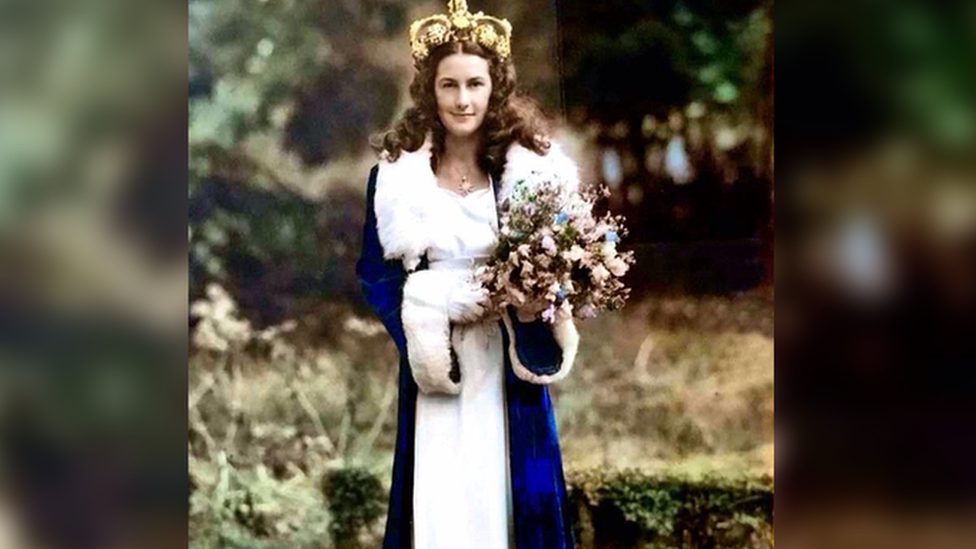
'Victory Queen' Betty Hughes was driven around street parties
Draped in a cloak, Betty Hughes was crowned "Victory Queen" in Holyhead, Anglesey.
The 96-year-old, who was just 21 back then, was living with her grandmother and working as an ambulance driver when the war ended.
With little money, she said the community rallied around to help her fit the part for the big day, with her family giving their ration coupons so she could afford the beautiful satin, which she picked out in Hendersons, in Liverpool.
A dress was made, a cloak hired and her crown paid for by the council.
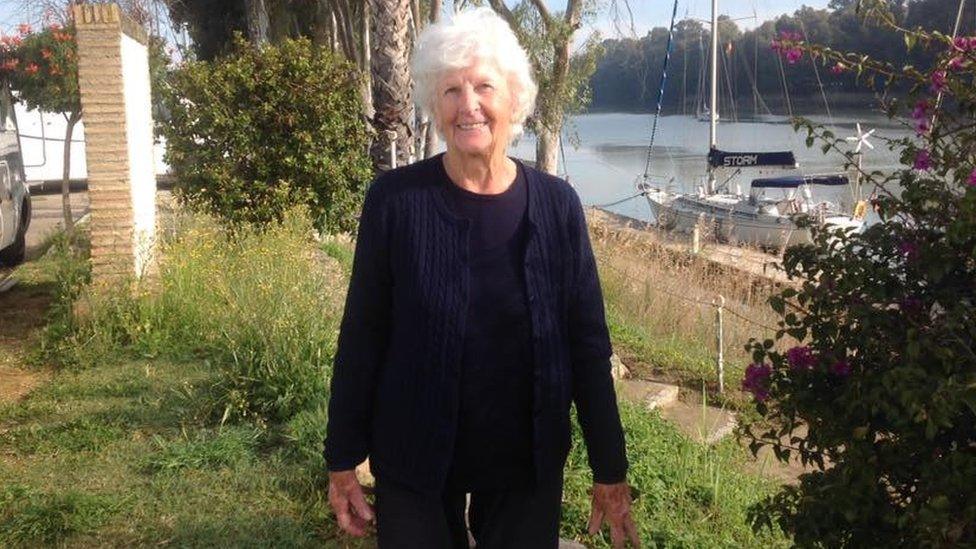
Now 96, Betty Hughes remembers being driven around Holyhead to different celebrations
When the day came she was crowned by "Mrs Darcie of Bangor".
"I was driven around in the Lord Mayor's car, to street parties," she said.
"I had to attend as many as I could and have a cup of tea at each one," she said.

The munitions factory worker
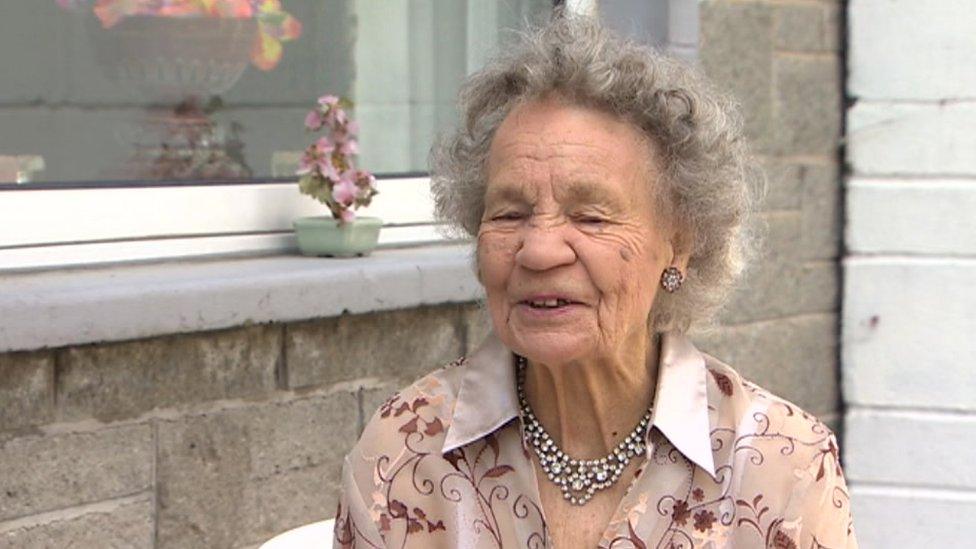
Eva May Cotter, 100 on Monday, remembers people's excitement on VE Day
Eva May Cotter heard about the German surrender on the TV, and remembers people partying in the streets.
The 99-year-old, who turns 100 on Monday, said VE Day was a "whirlwind", with "tables all up the road" where she lived in Cynon Valley.
"We all had caps with red, white and blue, we made sandwiches and cakes and everything for the children," she said.
Eva, who now lives in Mountain Ash, had just left school when the war broke out, and she was called up to make shells in a munitions factory in Abercynon.
She gave birth to her son after her husband, Dennis, visited while on leave, and she said doing it on her own "wasn't easy".
When Dennis returned he worked as a colliery shift engineer, but Eva said after the war things were hard.
"People were poor," Eva said. "It was a struggle, no one was rich, but we all survived."
- Published8 May 2020
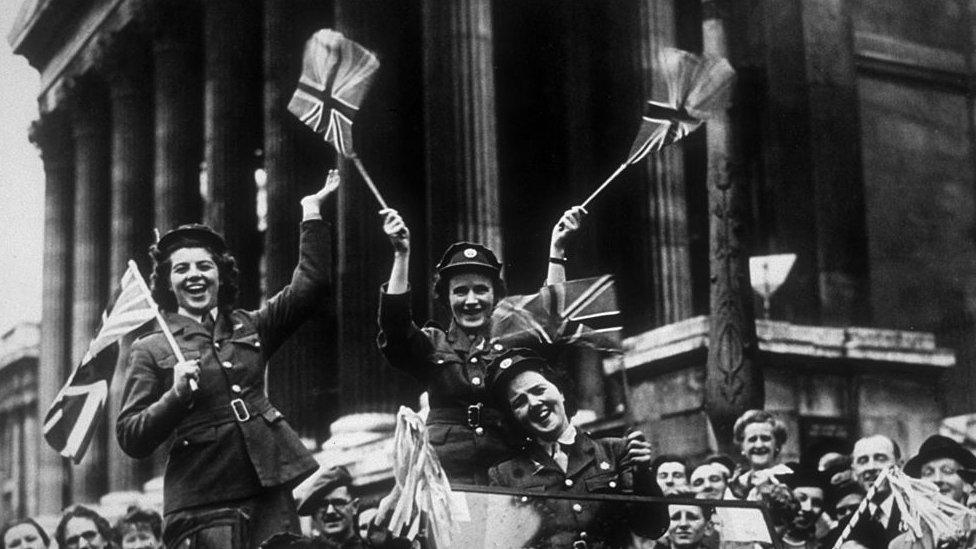
- Published3 May 2020
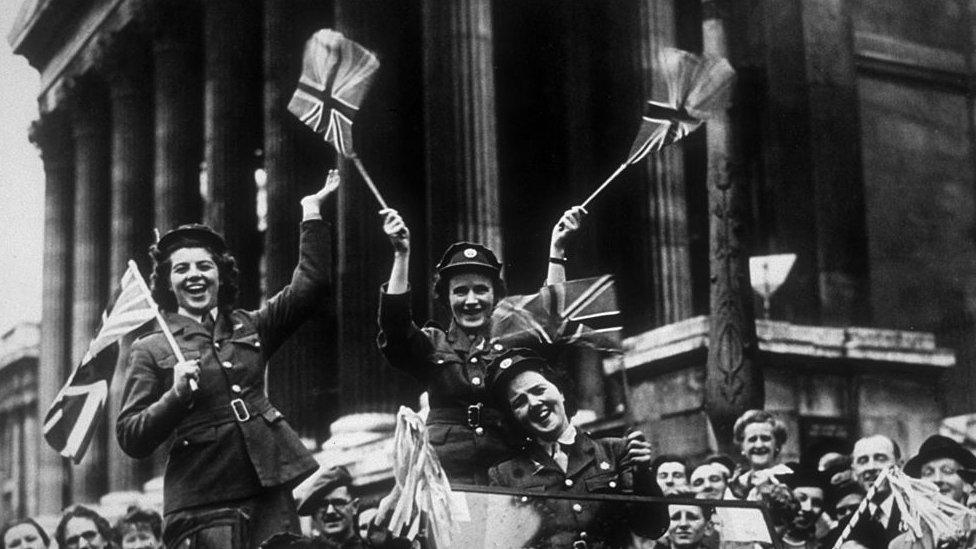
- Published18 April 2020
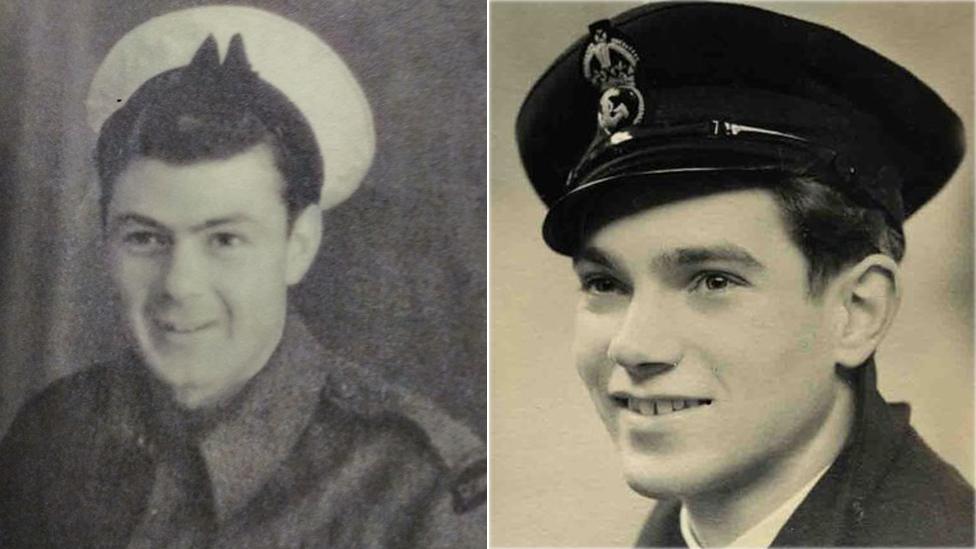
- Published8 May 2015
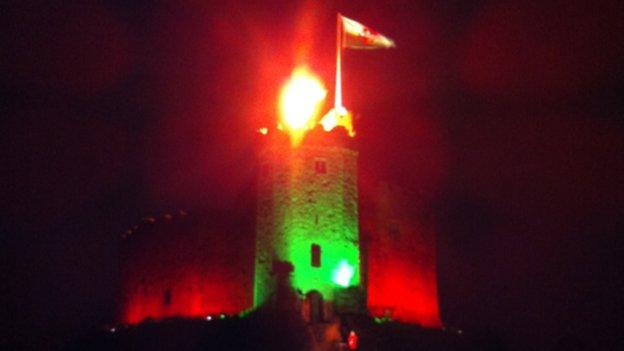
- Published1 September 2014
